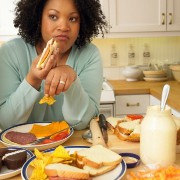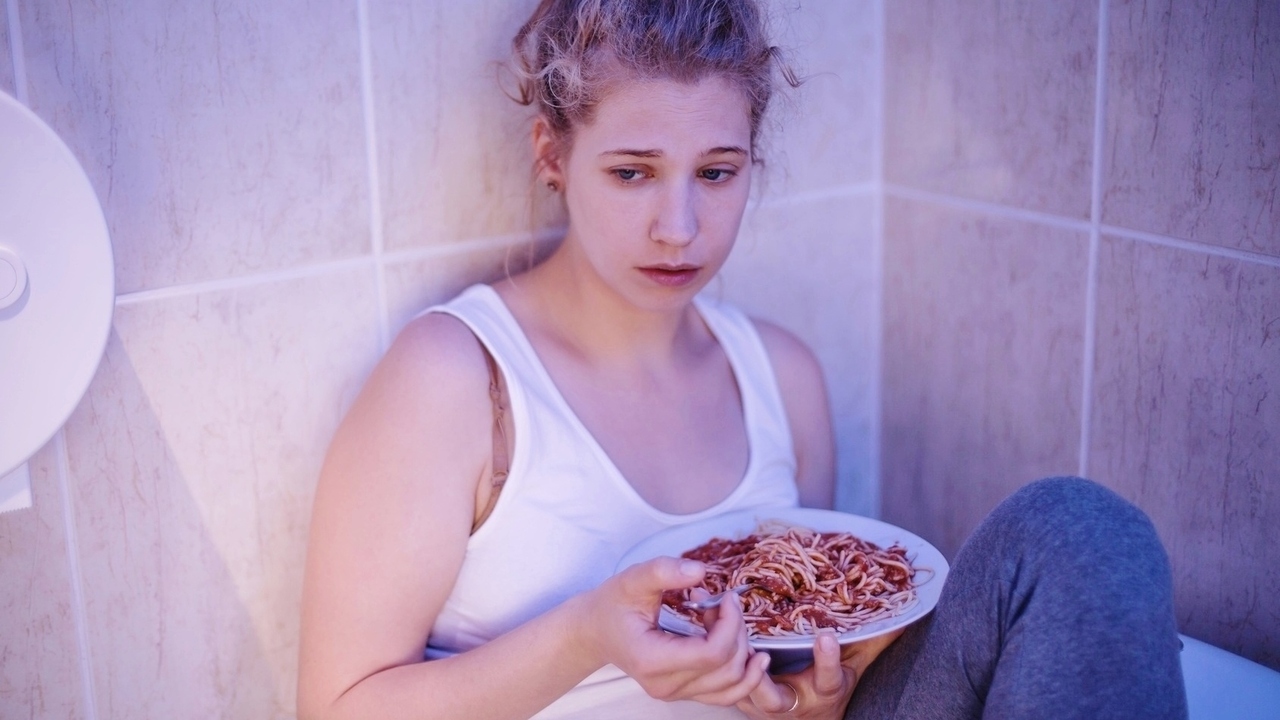 Photo: Getty Images
Photo: Getty Images
Binge-eating disorder and emotional eating are not considered official diagnoses, but there is no doubt that many women (and men) suffer from issues with overeating or dysfunctional eating.
National Eating Disorders Awareness Week, from Feb. 20-26, 2011, focuses on bulimia and anorexia, since those are official eating disorders, but dysfunctional eating that can lead to weight gain is sometimes overlooked as a more severe psychological problem. It can be a coping mechanism for dealing with stress and emotions and depression. Many people assume obesity is just a result of bad choices and a conscious, deliberate choice of the person who is obese.
“In the next edition of the psychiatric diagnostic manual … binge-eating disorder will be an official disorder, the same as anorexia and bulimia, so at that point it will probably get more attention,” said Edward Abramson, a professor emeritus of psychology at California State University and a clinical psychologist. “Right now, it’s not seen officially as a psychiatric disorder.”
In the current Diagnostic and Statistical Manual of Mental Disorders, there is an “eating disorder not otherwise specified” category that includes binge-eating disorder. It’s described as “recurrent episodes of binge eating in the absence of the regular use of inappropriate compensatory behaviors characteristic of bulimia nervosa.” There is also the binge-eating/purging subtype of anorexia nervosa, but binge-eating is not an official separate disorder.
The DSM 5 website proposes to create a separate category for this disorder. One of the main symptoms it lists is “eating, in a discrete period of time (for example, within any 2-hour period), an amount of food that is definitely larger than most people would eat in a similar period of time under similar circumstances.” There are other characteristics associated with binge-eating, such as “feeling disgusted with oneself, depressed, or very guilty afterwards.”
“Binge-eating … typically involves not just eating a huge amount of food in a short period of time, although that’s the most obvious aspect of it, but people who are binge-eaters will frequently report that they have a sense of losing control over their eating,” said Abramson, who is also the author of “Emotional Eating: What You Need to Know Before Starting Your Next Diet.”
Binge-eaters are not necessarily overweight, he said.
“There’s some binge-eaters who are bulimic who will binge and then compensate for their binge by inducing vomiting or taking laxatives or overexercising,” Abramson said. “Those folks … they may be a little bit overweight, but they’re typically not obese. On the other hand, people who are bingers and don’t compensate usually are obese.”
Not everyone who overeats or has dysfunctional eating habits is a binge-eater.
“Emotions affect eating even when it doesn’t result in a binge,” Abramson said. “There are lots of people who eat in response to emotions, even though they don’t have a loss of control or may not be eating huge quantities of food.”
Food can be used for comfort in many cases, especially after a stressful event.
“In the less extreme examples, people use food to make themselves feel better when they’re emotionally upset,” Abramson said. “It’s not pathological, but on the other hand if you’re watching your weight or if you’re concerned about your weight, then certainly it contributes unnecessary calories.”
Abramson has some suggestions for people who have problems with emotional eating.
“Find other ways of soothing yourself or dealing with emotional turmoil,” Abramson said. “It’s important to identify what your pattern is, and then you can work on changing the specific behaviors related to your anger or to my stress.”
Cravings for food can be difficult to deal with, but it is possible.
“Cravings typically don’t last forever,” Abramson said. “On average they go away in about 20 minutes or so. One of the best things you can do is to do something physical.”
Instead of rewarding yourself with a Kit Kat when you get home, do something not involving food, like painting your nails or cleaning your house or apartment (Hey, it can feel nice to be in a clean house and you can feel a sense of accomplishment).
Janet R. Laubgross, Ph.D, a clinical psychologist in private practice in Virginia who specializes in weight management, acknowledges that some people still might not understand there are psychological and emotional issues involved with binge-eating and emotional eating, and that some people can’t necessarily just stop eating.
“I think as a society we’re getting more and more comfortable with psychological issues, but I think there’s always going to be people who do not understand it,” Laubgross said. “Hopefully the people who are in the position to treat these things will take it more seriously, like if you go to a physician and you’re having trouble with your eating – that hopefully the physician will consider ‘Gee, maybe there’s an emotional component.’”
It’s important for the general public to know how psychological binge-eating and emotional eating can be.
“These are truly psychological problems,” Laubgross. “It’s not just because that person’s weak or has bad willpower … the way our society is promotes this disordered eating.”
She also said it can be tough for women to avoid binge-eating and emotional eating.
“Our society promotes … us to be athletic-looking or thin-looking … and yet everywhere you go, there’s advertisements about food and you pass food everywhere you go all the time,” Laubgross said. “And we have a society where people are constantly eating and drinking.”
There is a prevalent stigma toward those who are overweight, and it’s hard to hide that issue as well.
“If you are overweight, everywhere you go, everybody knows … that you have that problem because it’s evident,” Laubgross said. “If you are anorexic but not super-skinny … people don’t necessarily know that. That’s not obvious.”
However, she said that women should know that they can improve their eating situation and that there’s other ways to deal with emotions besides excessive eating. Being overweight can cause serious health problems, so it’s important to tackle disordered eating with the help of a therapist and by following some following tips.
“The first thing is that you’ve got to have proper nutrition,” Laubgross said. “For example … if you can start the day off with a healthy breakfast, not something on the run … it will set the stage for you to eat much healthier all day.”
Talking to others about any issues you’re having is important, as well as staying active and participating in relaxation techniques, instead of giving into disordered eating, she said.
“You have to retrain yourself to do these things,” Laubgross said.
Have you had issues with binge-eating or emotional eating? How are you handling it or trying to stop? Have you been successful in engaging in more healthy eating behaviors? How did you retrain yourself? Answer in the comments below.
Sources:
http://www.dsm5.org/ProposedRevisions/Pages/proposedrevision.aspx?rid=372
http://helpguide.org/mental/binge_eating_disorder.htm
http://www.medicalnewstoday.com/articles/173184.php
http://www.womenshealth.gov/faq/binge-eating-disorder.cfm





Add a Comment1 Comments
I'm just starting to realize that I have a problem w emotional eating. Every time I get mad at my husband or feel sad or lonely, I eat stuff I'm not supposed to -- and too much of it. Thanks for the article. I was looking for help online.
January 5, 2012 - 11:10amThis Comment